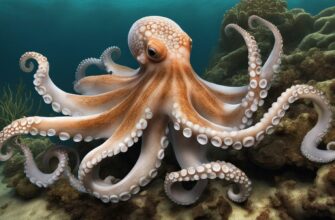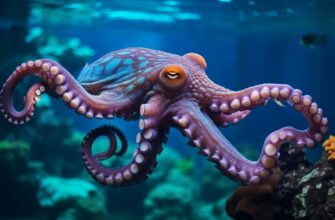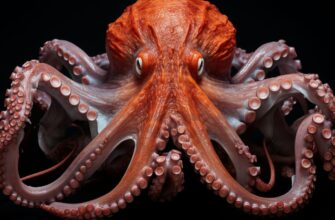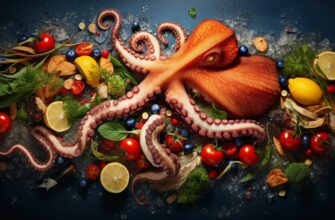Octopuses are fascinating creatures with a unique digestive system that sets them apart from other animals. The question on many people’s minds is how many stomachs does an octopus have? In this article, we will explore the intricacies of an octopus’s digestive system and uncover the answer to this intriguing question.
By understanding the anatomy of an octopus, including its internal organs, we can gain insight into how its multiple stomachs contribute to its feeding habits and survival. The complexity of an octopus’s digestive system is truly fascinating, and we will investigate it further in the following sections.
- The Anatomy of an Octopus
- How Many Stomachs Does an Octopus Have?
- The Function of Octopus Stomachs
- FAQ – Common Questions about Octopus Stomachs
- Q: How many stomachs does an octopus have?
- Q: What types of food do octopuses eat?
- Q: How does an octopus digest its food?
- Q: Do octopuses have any other unique digestive features?
- Q: How long does it take for an octopus to digest its food?
- Q: Can an octopus regurgitate its food?
The Anatomy of an Octopus
Octopuses have a unique anatomy that sets them apart from other creatures in the animal kingdom. Their bodies are soft and boneless, allowing them to squeeze through tight spaces and escape predators. Inside an octopus’s body, we find an intricate system of organs and tissues that work together to keep the animal alive and functioning.
Of particular interest is the octopus’s digestive system, which plays a critical role in the creature’s survival and feeding habits. The digestive system is made up of several organs, including the stomachs, intestines, and digestive glands.
| Organ | Function |
|---|---|
| Stomachs | Break down food and absorb nutrients |
| Intestines | Remove waste from the body |
| Digestive glands | Produce enzymes that aid in digestion |
Octopuses are capable of incredible feats of agility and intelligence, making them a fascinating creature to study. Understanding the anatomy of an octopus can give us insights into how it functions within its environment and how it has adapted to survive in the ocean.
How Many Stomachs Does an Octopus Have?
Octopuses are fascinating creatures with unique anatomy that sets them apart from other animals. One of their most intriguing features is their digestive system, which includes multiple stomachs.
So, how many stomachs does an octopus actually have? The answer may surprise you.
| Stomach Type | Number of Stomachs |
|---|---|
| Crop | 1 |
| Stomach | 1-2 |
| Ceca | 2 |
While different species of octopuses may have varying numbers of stomachs, most have a crop, one or two main stomachs, and two ceca. The crop stores food before it moves on to the stomach, where it is broken down by enzymes. The ceca absorb nutrients from the food, and any remaining material is excreted through the anus.
This complex digestive system allows octopuses to feed on a variety of prey, from crustaceans to fish, and digest their meals efficiently. The different sections of their stomachs work together to extract as many nutrients as possible from their food.
Overall, octopuses are truly unique creatures that continue to fascinate scientists and animal lovers alike. Their multiple stomachs are just one of the many features that make them an intriguing subject for study and observation.
The Function of Octopus Stomachs
Octopuses have a unique digestive system that consists of three distinct stomachs: the crop, the glandular stomach, and the digestive gland. Each stomach serves a specific function in the digestion process.
The crop is the first stomach in the system and serves as a storage chamber for food. It allows octopuses to eat large amounts of food quickly and then digest it over time. The crop also helps the octopus to regulate its buoyancy by adjusting the amount of gas inside it.
The glandular stomach is the second stomach and primarily serves as a site for the secretion of digestive enzymes and acidic fluids. These fluids help to break down the food into smaller particles, making it easier for the octopus to digest and absorb the nutrients.
The third stomach is the digestive gland, which is responsible for absorbing the nutrients from the food and distributing them to the rest of the body. This gland also detoxifies any harmful chemicals or substances that may be present in the food.
Octopuses are known for their unique feeding habits, which involve crushing and tearing apart their prey with their sharp beaks. The food is then processed through the three stomachs, allowing the octopus to extract as many nutrients as possible from each meal.
One interesting fact about octopus digestion is that they can eject their stomachs out of their mouths to help them digest particularly tough prey, such as crabs or clams. The stomach then engulfs the food item and brings it back into the body for digestion.
In conclusion, the three stomachs of an octopus work together to efficiently break down and absorb nutrients from its food. This unique digestive system allows these creatures to survive in their diverse ocean environments and thrive on a variety of prey.
FAQ – Common Questions about Octopus Stomachs
Q: How many stomachs does an octopus have?
A: Octopuses have three hearts and a total of two stomachs. One stomach is used primarily for grinding up food while the other is responsible for further breaking down the food chemically.
Q: What types of food do octopuses eat?
A: Octopuses eat a variety of foods, including shellfish, crabs, clams, and other small marine creatures. They have also been known to eat small fish and even other octopuses.
Q: How does an octopus digest its food?
A: After capturing its prey with its tentacles, the octopus uses its sharp beak to break down the food into smaller pieces. The ground-up food is then transported into the grinding stomach, where it is further broken down. Finally, the food moves into the digestive stomach where enzymes and stomach acid break it down chemically.
Q: Do octopuses have any other unique digestive features?
A: Yes, they do! Octopuses have a specialized digestive gland known as a “hepatopancreas” which aids in digestion. This gland secretes enzymes that help break down and absorb nutrients from the food.
Q: How long does it take for an octopus to digest its food?
A: The time it takes for an octopus to digest its food can vary depending on the size and type of food. Generally, it takes a few hours to a few days for the octopus to fully digest its meal.
Q: Can an octopus regurgitate its food?
A: Yes, an octopus can regurgitate its food if it is under stress or feels threatened. This is a defense mechanism that helps the octopus to distract predators while it makes its escape.









